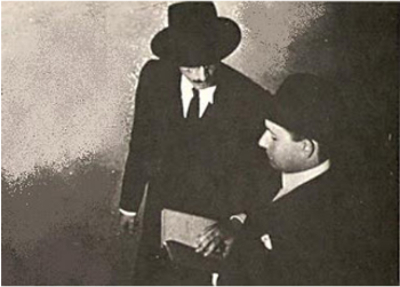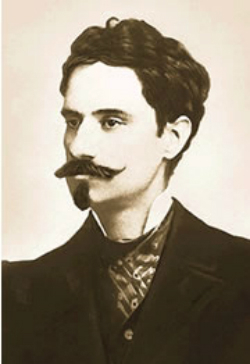The Secret Things of the Soul
In all souls there are secret things whose secret is kept until their death. And they are kept, even in the most sincere moments, when in the abysses we expose ourselves, all in pain, in a streak of anguish, in the face of dearest friends - because the words that could translate them would be ridiculous, petty, incomprehensible at all insightful. These things are materially impossible to say. Nature itself closed them - not allowing the human throat to make sounds to express them - only sounds to caricature them. And as these innermost ideas are the things we cherish the most, we always lack the courage to caricature them. Hence the “isolated” that all of us men are. Two souls who fully understand each other, who know each other, who know each other about everything that lives in them - do not exist. Nor could they exist. On the day they fully understood each other - O ideal of lovers! - I'm sure they would merge into one. And the bodies would die.
Mário de Sá-Carneiro, in 'Letters to Fernando Pessoa'
The fragment you read above is part of one of several letters exchanged between Mário de Sá-Carneiro and Fernando Pessoa, two of the most important poets of the Portuguese language and the greatest representatives of modernism in Portugal. The letters, through which the two great friends communicated during Mario's years of isolation in France, were published posthumously in 1958, see their rich literary content. Through the correspondences, we can see a poet anguished and tormented by the recurrent idea of suicide, a violence he would commit at the age of thirty-six.
Mario de Sá-Carneiro was born in Lisbon, Portugal, on May 19, 1890. At the age of two, he lost his mother, and the pain of maternal absence accompanied him throughout his brief life. After the death of his wife, Mário's father, a high-bourgeoisie military, handed his son over to his grandparents and followed for a life of travel, always funding the studies of the one who would become one of the greatest poetic voices of Portugal. At the age of twenty-one, Mário moved to Coimbra, where he entered the traditional Faculty of Law, having not even completed the first year of graduation. It was at this time, the year was 1912, that he met the one who would be his best friend and confidant, Fernando Pessoa.

The correspondence exchanged with his friend Fernando Pessoa was published thirty-two years after his death
In 1915, next to Fernando Pessoa, Raul Leal, Luís de Montalvor, Almada Negreiros and the Brazilian Ronald de Carvalho, helped found the magazine orpheus, the first publication to publicize the modernist ideals and cultural trends that circulated in Europe at the beginning of the 20th century. The magazine did not go beyond the second issue, but it fulfilled the purpose of scandalizing the bourgeoisie used to the literary canon in force until the early years of the 20th century. Mário, influenced by Pessoa, joined the avant-garde currents, such as intersectionism and futurism, expressing in his poetry all his difficulty in assuming himself as an adult and in overcoming the barriers between reality and ideality.
In his poems, melancholy, narcissism, frustration and the feeling of abandonment overflow, the latter related to the premature death of his mother, a fact that deeply marked him. In Paris, where he began his studies at the University of Sorbonne, his life took on dramatic contours, having given himself over to an unruly life, a fact that aggravated his already fragile emotional health. He abandoned his studies and during this period intensified his contact with Fernando Pessoa, always reporting to his friend his desire for suicide in permeated letters. by an ironic and self-sacrificing language, in which it is possible to observe an intense mood swing of the poet with a sensitive and egoic.
On April 26, 1926, staying at a hotel in the French city of Nice, Mário de Sá-Carneiro fulfilled his intent, ending an existence marked by suffering and anguish when consuming several bottles of strychnine. Days before, already tormented by the idea of suicide, he wrote what was his last letter to Fernando Pessoa:
My dear friend.
Barring a miracle next Monday, 3 (or even the day before), your Mário de Sá-Carneiro will take a strong dose of strychnine and disappear from this world. It is just like that – but it costs me so much to write this letter because of the ridicule that I always found in the “farewell letters”... It's no use pitying me, my dear Fernando: after all I have what I want: what I've always wanted so much – and I, in truth, didn't do anything around here... He had already given what he had to give. I don't kill myself for anything: I kill myself because I put myself by the circumstances – or rather: I was placed by them, in a golden temerity - in a situation for which, in my eyes, there is no other exit. Before that. It's the only way to do what I'm supposed to do. I've been living for fifteen days a life as I've always dreamed: I had everything during them: the sexual part performed, in short, from my work – experienced the hysterics of your opium, the zebra moons, the purple flyaways of your Illusion. I could be happy for a longer time, everything is going on for me, psychologically, wonderfully, but I don't have any money. […]
Do not stop now... There's more after the advertising ;)
Mário de Sá-Carneiro, letter to Fernando Pessoa, March 31, 1916.
His literary work is composed of books Principle (novels - 1912), memoirs of paris (collection of memoirs - 1913), Lucius' Confession (novel - 1914), Dispersal (poetry - 1914) and the last one published in his lifetime, sky in fire (novels – 1915). The letters exchanged with Fernando Pessoa were compiled and published in two volumes in 1958 and 1959, becoming an object of analysis for scholars of literature. So that you can learn a little more about the poetry of Mário de Sá-Carneiro, Brasil Escola presents for you one of the the writer's best known poems, whose nihilism and disenchantment made literature one of the most beautiful contributions. Good reading!

Craziness... is one of the novels published in the book Principle. Lucius' Confession is a short story that integrates the homonymous book by Mário de Sá-Carneiro
|
Dispersal I got lost inside me I don't feel the space I close |
your golden mouth Paris, May 1913. |
By Luana Castro
Graduated in Letters

